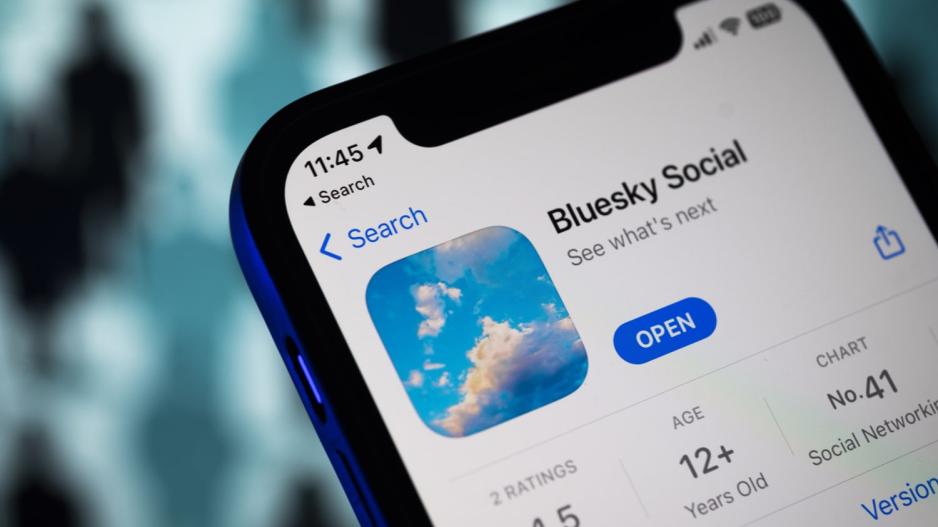The social media landscape has long been dominated by platforms that prioritize engagement, advertising revenue, and growth. However, as the digital world matures, users are becoming increasingly concerned about the toll these platforms take on mental health. Amidst this growing scrutiny, a new contender, Bluesky, has entered the scene. With its promise of a decentralized, user-focused environment, Bluesky is positioning itself as a healthier alternative to X (formerly Twitter). Early adopters claim the platform fosters a sense of community and enhances mental wellbeing, sparking widespread interest and comparisons with its more established competitor.
The Genesis of Bluesky: A Decentralized Vision
Bluesky began as a project funded by Twitter in 2019, with the aim of developing an open and decentralized social media protocol. The initiative sought to address long-standing issues in traditional platforms, such as centralization of power, lack of data privacy, and content moderation challenges. After Elon Musk’s acquisition of Twitter and its transformation into X, Bluesky became an independent entity, accelerating its development as an alternative platform.
At its core, Bluesky operates on the Authenticated Transfer Protocol (AT Protocol). This decentralized system allows users to maintain control of their data and online identity, offering a stark contrast to the centralized model of X, where user data is largely monetized through advertisements. By empowering users with autonomy, Bluesky appeals to a growing demographic seeking greater control and transparency in their online interactions.
The Mental Health Crisis in Social Media
The debate surrounding social media and mental health is not new. Studies consistently show that excessive use of platforms like Twitter (now X), Facebook, and Instagram can exacerbate feelings of anxiety, depression, and loneliness. A primary reason for this is the algorithm-driven nature of these platforms, designed to maximize engagement often at the expense of users’ emotional well-being. Controversial content, divisive opinions, and hate speech tend to garner more attention, creating an environment where negativity thrives.
For instance, X has faced criticism for its failure to address harassment and toxic behavior effectively. After Musk’s acquisition, many users reported an uptick in abusive content, with the platform scaling back moderation efforts in favor of promoting “free speech.” This has left a significant portion of its user base feeling unsafe and overwhelmed.
Amidst this landscape, Bluesky’s entry has been welcomed as a much-needed antidote. The platform’s focus on decentralization, transparency, and community-driven moderation has resonated with users looking for a healthier and less combative digital experience.
How Bluesky Is Different
Bluesky’s unique approach sets it apart in several key areas that directly impact mental health and user satisfaction:
1. Customizable Algorithms
Unlike X, where algorithms dictate what users see based on engagement metrics, Bluesky allows individuals to personalize their feed algorithms. Users can curate their content, prioritizing topics, creators, or communities that align with their interests. This eliminates the anxiety-inducing nature of algorithmically amplified sensationalism.
2. Community Moderation
Bluesky empowers users to self-moderate through community-driven tools. Instead of relying on a centralized authority to enforce content rules, Bluesky allows groups to establish their own guidelines and moderation practices. This fosters a sense of ownership and responsibility, reducing the prevalence of toxic behavior.
3. Ad-Free Environment
Currently, Bluesky operates without advertisements, freeing users from the constant barrage of promotional content. This absence of commercial pressure creates a more serene experience, where users can engage meaningfully without distractions.
4. Decentralization
Bluesky’s decentralized architecture ensures that users retain ownership of their data. This is a stark contrast to X, where data is monetized and subjected to corporate interests. By offering control and privacy, Bluesky appeals to users disillusioned with traditional platforms.
The User Experience: What People Are Saying
Early adopters of Bluesky have been vocal about the platform’s positive impact on their mental health. Many describe it as a “calmer” and “more thoughtful” space compared to the high-pressure environment of X.
Amy Sullivan, a writer from Seattle, shared her experience:
“After years on Twitter, I started to feel like my mental health was deteriorating. The constant arguments, outrage, and trolling were exhausting. Bluesky feels like a fresh start. It’s not perfect, but the smaller community and customizable features have made my online experience much healthier.”
Another user, Mark Peterson, highlighted the platform’s emphasis on meaningful conversations:
“Bluesky feels like a place where people actually want to connect and share ideas, not just argue or promote themselves. The lack of ads and algorithmic manipulation has made a huge difference in how I feel about spending time online.”
The Downside of X: A Toxic Legacy
While Bluesky’s rise has been met with enthusiasm, it also shines a spotlight on the shortcomings of X. Under Musk’s leadership, the platform has undergone significant changes, many of which have alienated its user base.
1. Increased Toxicity
Musk’s emphasis on free speech has been criticized for enabling hate speech and harassment. The reduction in content moderation staff has made X a less welcoming environment, particularly for marginalized communities.
2. Algorithmic Manipulation
X’s algorithms prioritize content designed to provoke engagement, often amplifying controversial or polarizing posts. This creates a feedback loop where negativity and outrage dominate users’ feeds, contributing to emotional burnout.
3. Subscription-Based Features
The introduction of Twitter Blue (now X Premium), a subscription model that offers additional features, has drawn mixed reactions. While some appreciate the added functionality, others view it as a monetization scheme that does little to address the platform’s deeper issues.
4. Data Monetization
As a centralized platform, X relies heavily on data collection for advertising purposes. This raises concerns about user privacy and the ethics of monetizing personal information.
A Broader Movement: The Search for Healthier Platforms
Bluesky’s growing popularity is part of a larger trend in the social media world: the search for platforms that prioritize user wellbeing. This shift is driven by increasing awareness of the mental health challenges associated with traditional social media and a desire for more authentic online interactions.
Several other platforms have emerged with similar goals:
- Mastodon: A decentralized social network offering ad-free, community-driven interactions.
- BeReal: Aimed at fostering authenticity by encouraging users to share unfiltered moments.
- Clubhouse: Focused on audio-based conversations that promote deeper connections.
These alternatives highlight the growing demand for healthier, more meaningful online experiences. While Bluesky is not alone in this space, its approach to decentralization and user empowerment sets it apart.
The Role of Decentralization in Mental Wellbeing
One of the most significant aspects of Bluesky is its decentralized structure. Unlike centralized platforms like X, where a single company controls the experience, decentralized systems distribute power and decision-making among users. This has profound implications for mental health:
- Increased Autonomy: Users have greater control over their data, interactions, and feed, reducing feelings of helplessness often associated with traditional platforms.
- Enhanced Privacy: Decentralization minimizes the risks of data exploitation, fostering trust and peace of mind.
- Community Ownership: By allowing users to moderate and shape their communities, Bluesky creates a sense of belonging and reduces hostility.
Decentralization represents a fundamental shift in how social media platforms are designed and operated, offering a potential solution to many of the issues that plague centralized systems.
The Challenges Ahead
While Bluesky has garnered praise, it is not without its challenges. As the platform grows, maintaining its positive attributes will become increasingly difficult. Scaling a decentralized system while preserving user control, moderation, and mental wellbeing is a complex task.
Professor Dana Ellis, a social media expert, warns:
“Bluesky’s current appeal lies in its small, curated user base and the novelty of decentralization. As it expands, it will face the same pressures as other platforms—commercialization, content moderation at scale, and competition. The key will be how it navigates these challenges without losing its core values.”
The Scalability Dilemma: Can Bluesky Maintain Its Edge?
One of the most pressing concerns about Bluesky is its ability to scale while preserving the qualities that make it appealing. Much of Bluesky’s charm lies in its smaller, more intimate user base, which fosters a sense of community and reduces the likelihood of toxic behavior. However, as the platform grows, it will inevitably face challenges similar to those experienced by X.
1. Moderation at Scale
Bluesky’s decentralized approach to moderation is effective for small, niche communities, but scaling this model poses significant challenges. Larger user bases bring diverse perspectives, cultural differences, and varying interpretations of acceptable content, making consistent enforcement difficult. While community-driven moderation empowers users, it may struggle to keep pace with the sheer volume of content on a global platform.
2. Algorithm Customization
Although Bluesky’s customizable feed algorithms are a standout feature, maintaining this level of personalization for millions of users could strain resources. Algorithms require constant updates and optimization, particularly when scaling to accommodate varied user behaviors and preferences.
3. Maintaining a Positive Culture
Many users describe Bluesky as a “safe haven” compared to X. However, as the platform grows, it may attract the same divisive elements that plague larger platforms. Balancing growth with the preservation of its positive culture will be a significant test.
4. Resource Limitations
Bluesky currently operates without advertisements, relying on external funding and grants. While this model supports a user-focused experience, it may not be sustainable as the platform grows. Introducing monetization strategies, such as premium features or targeted ads, could alter the user experience and potentially alienate its core audience.
The Rivalry Intensifies: How X is Responding
As Bluesky gains traction, X is under increasing pressure to retain its user base and address longstanding criticisms. Elon Musk’s leadership has brought both innovation and controversy to the platform, but many argue that X has yet to address its fundamental issues.
1. Rebranding and New Features
The transformation of Twitter into X aimed to signal a new era, with Musk positioning the platform as an “everything app.” Features such as long-form content, expanded monetization options, and a focus on video content have been introduced to diversify its offerings. However, these changes have done little to tackle the core complaints of toxicity, algorithm manipulation, and declining user satisfaction.
2. Paid Subscriptions
X’s introduction of X Premium (formerly Twitter Blue) has received mixed reactions. While it offers benefits such as priority visibility and editing tools, critics argue that it creates a two-tier system that disadvantages non-paying users. This approach contrasts with Bluesky’s egalitarian model, which emphasizes user empowerment over monetization.
3. Struggles with Content Moderation
X’s reduced emphasis on content moderation has drawn significant criticism. Musk’s commitment to free speech has been interpreted by some as a license for hate speech and harassment, alienating users who prioritize safety. In contrast, Bluesky’s community-driven moderation resonates with those seeking a more respectful online environment.
Bluesky’s Long-Term Potential
Despite the challenges, Bluesky has several factors working in its favor, positioning it as more than just a niche alternative.
1. Growing Demand for Decentralization
Decentralization is more than a buzzword; it represents a paradigm shift in how online platforms are structured. By prioritizing user autonomy and data privacy, Bluesky taps into growing dissatisfaction with centralized platforms like X and Facebook. As awareness of data exploitation and surveillance capitalism increases, Bluesky’s model could become increasingly appealing.
2. Aligning with User Values
Modern users, particularly younger generations, value authenticity, transparency, and ethical practices. Bluesky’s emphasis on these principles aligns with the evolving expectations of its audience. As more users seek platforms that prioritize wellbeing and community over profit, Bluesky could establish itself as a leader in ethical social media.
3. Early-Mover Advantage
Bluesky’s position as one of the first decentralized social media platforms gives it a unique advantage. While competitors like Mastodon and Threads have made strides, Bluesky’s focus on user-friendly design and algorithm customization sets it apart. Building a loyal user base early could solidify its place in the market.
What Users Want: A New Era for Social Media
The rise of Bluesky and the challenges facing X reflect broader shifts in user expectations. Social media, once celebrated for its ability to connect people, is increasingly scrutinized for its impact on mental health, privacy, and societal polarization. Users are demanding platforms that prioritize:
- Meaningful Interactions: Instead of prioritizing engagement for its own sake, platforms need to foster genuine connections and thoughtful discussions.
- Transparency: Users want to understand how algorithms work and how their data is used.
- Safety and Respect: Robust moderation systems are essential to creating environments where all users feel welcome and respected.
- Mental Wellbeing: Features that reduce anxiety, burnout, and information overload are becoming non-negotiable for many users.
Bluesky’s success thus far can be attributed to its ability to address these demands. Whether it can continue to do so as it scales remains to be seen.
A Broader Social Media Transformation
The rivalry between Bluesky and X is not just about two platforms—it’s emblematic of a broader transformation in the social media industry. As users become more discerning, platforms that fail to adapt risk losing relevance. This shift could lead to:
- Increased Competition The success of Bluesky may inspire other platforms to adopt decentralized models or prioritize user wellbeing. Greater competition could drive innovation and lead to healthier online ecosystems.
- Regulatory Changes Governments worldwide are scrutinizing social media platforms for their role in spreading misinformation, fostering addiction, and exploiting user data. Platforms like Bluesky, which emphasize transparency and user control, may be better positioned to navigate regulatory challenges.
- Redefining Success Metrics Traditional platforms have long measured success through metrics like user engagement and ad revenue. However, the rise of Bluesky suggests that future success may be defined by user satisfaction, retention, and positive societal impact.
Conclusion: The Future of Bluesky and X
The rise of Bluesky marks a pivotal moment in the evolution of social media. By prioritizing decentralization, transparency, and mental wellbeing, it challenges the status quo and offers a glimpse into what the future of online interaction could look like. However, scaling sustainably while maintaining its core values will be its greatest challenge.
For X, the emergence of competitors like Bluesky underscores the need for introspection and adaptation. While Musk’s vision for X as an “everything app” may appeal to some, addressing issues like toxicity, algorithmic manipulation, and user dissatisfaction will be critical to its long-term success.
Ultimately, the choice between Bluesky and X reflects broader societal questions about the role of technology in our lives. As users, we must decide what we value in our online communities and support platforms that align with those principles. Whether Bluesky represents a passing trend or the beginning of a larger movement remains to be seen, but one thing is clear: the future of social media is being rewritten, one platform at a time.




